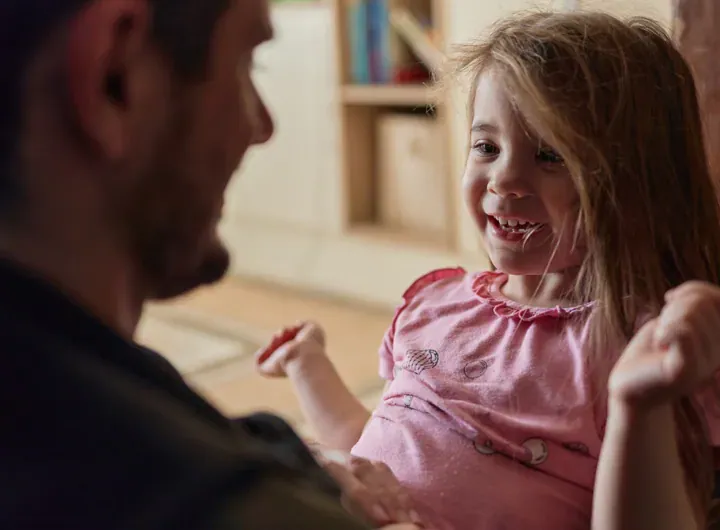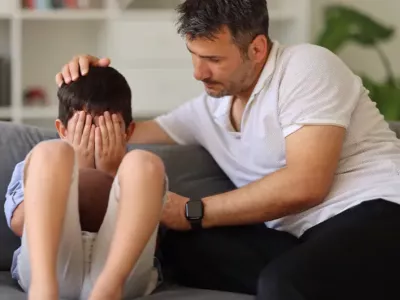How to stop yelling at your kids: try these parenting strategies

Parenting can sometimes be a real test of patience. It may feel like kids push your buttons and sometimes keeping cool is hard.
You may have repeatedly asked them to do something, but it doesn't work.
In those moments, frustration can bubble over, and you end up raising your voice to get them to listen.
Sometimes, you might find yourself yelling at kids from another room to get their attention, especially when you're busy or tired.
If you're relying on yelling or shouting to try to get your message across, it might be time to rethink your approach.
Is it okay for parents to yell at their kids?
At some point or another, most parents will raise their voice. However, if you find yourself frequently yelling to get your kids to do what you ask, you might notice a few things happening:
- Your children tune out. This could be because they've become accustomed to yelling, and it no longer has an impact.
- Yelling can also create a cycle where getting kids to cooperate becomes more and more tricky. The parent yells and their child doesn't listen, so they yell again, and the cycle continues.
- If you're dealing with tantrums or aggressive behaviour, your first instinct might be to get loud or angry. But you’re noticing it makes the situation worse.
- It's also possible that your child may yell at you or others. This could be because children can quickly learn that shouting and yelling are acceptable and start doing the same.
Yelling may feel like a good way to be heard because it's so loud.
However, yelling can contribute to feelings of anxiety, low self-esteem, confusion and sadness. It can also have long-term effects on their mental health and wellbeing.
It can affect parents, too.
Parents who scream or shout might end up feeling guilty for yelling. Studies show feeling shame or guilt as a parent can bring down your confidence in your skills and negatively impact how you see yourself as a parent.1
So, what can you do instead of yelling at your child? Try these positive parenting strategies.
Rather than raising your voice: take a slow, deep breath and pause
When we feel frustrated or overwhelmed, yelling can become an automatic response.
Try to be aware of the signs that your frustration is building up, and take a moment to pause and reset before reacting.
This can help to make those intense feelings feel less overwhelming.
If necessary, take a short break from the situation and come back to it when you feel calmer.
When you speak to your children, try to get close. Use a calm and clear tone of voice. This helps them to listen and cooperate.
By keeping check of your own emotional response, you also set a good example for kids. They learn a lot from just watching how we handle stress.
Yelling at your kids: catch unhelpful thoughts and reactions
“They NEVER do what I say.”
“I just can’t cope with this!”
When you are in a stressful situation, negative thoughts and reactions can easily take over your mind.
You might start blaming yourself or others, feeling overwhelmed and unable to cope.
Instead of letting these thoughts make you feel more stressed, think of a few coping statements to help calm yourself down.
Coping statements are positive affirmations that remind you that you can handle the situation and your emotions. You can use them in anytime, whether it's getting kids ready for bed or getting out the door on time for school.
Here are some examples of coping statements:
- Yelling and shouting about it doesn’t help, it makes everyone feel worse — what are some helpful things I can do instead?
- I’m feeling stressed – that’s normal – but I can cope with this feeling.
- Just take a moment to breathe.
- I did it – I dealt with it calmly and felt a lot more comfortable than before.
- Next time I will try to stay calm and not let things get to me.
You may even like to note them down to look at them when needed.
Managing your own stress: a key positive parenting strategy
When we yell or shout, it can be a sign of stress.
Family life can be busy. High stress levels often make it hard to be calm and consistent with children.
Try to look for ways to decrease your workload. Sharing responsibility for chores and child care with a partner or other family members can be really helpful.
Don’t be afraid to politely say "no" if people ask you to do too much. Sometimes the pressure to be the "perfect" parent means we overcommit to activities and responsibilities.
Try to find some “me time” each day. This can help you deal with ups and downs more positively.
If you have a partner, talk to them about how you can manage frustration or stress together as a family. If they are yelling at your kids too, maybe it’s time to rethink your approach together.
If you, your partner or your child's behaviour is concerning you, it’s okay to ask for support. Take action and seek help rather than waiting for things to change.
Yelling at your kids? Try consistent rules and routines
A few adjustments to your parenting style can make a big difference. Here are a few examples:
- Try establishing a few new routines, like packing their bags the night before school. It's a small step that can make a big difference!
- Having clear and consistent rules will help your kids understand what is expected of them, and that can lead to better cooperation.
- Notice the good things your kids do, and give them specific praise. For example, “I noticed what a good job you did with taking a deep breath and trying again. How did that feel this time?” or “Thank you for getting things ready in the morning. That’s really helpful!” This can increase the chance they’ll repeat that positive behaviour later.
- Find little moments to bond with your child. A strong relationship can help them develop important skills like self-regulation, listening and cooperation.
I screamed at my child and feel horrible: now what?
If we yell, scream or shout, it’s a good idea to take ownership and let your child know you’ll work on being calmer in the future.
A simple apology teaches kids it's okay to make mistakes. It lets them know it’s important to take responsibility for mistakes and try to make things right.
For example – “I’m sorry I yelled at you. It’s not okay to yell. I could have taken some deep breaths to stay calm. I’ll work on being calmer in the future.”
Kids learn a lot from the important adults around them, especially when it comes to managing emotions and stress.
When things are relaxed (not in the middle of a problem), talk to your child about managing feelings.
You can tell them that it's okay to feel upset or angry, but yelling and shouting is not a good way to express ourselves. You can also discuss calming techniques, like taking deep breaths or switching to a different activity.
If yelling is becoming a pattern, you can change it with time and practice. So don't give up, and keep trying.
If feelings of anger are taking over…
If you're worried about the impact that yelling, shouting, or screaming may have on your children, reach out to a partner, trusted friend, family member, or your doctor for support.
Help is available, and sometimes talking to someone is the first step to making positive changes.
REFERENCES
1 Sirois et al. (2019). Self-compassion improves parental well-being in response to challenging parenting events. J Psychol, 153(3), 327.

